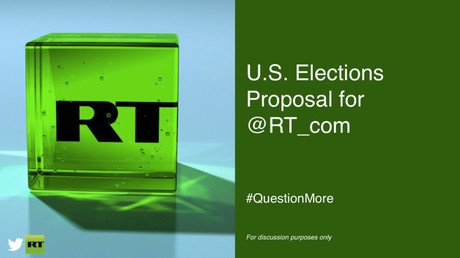Thorny dilemma: Will Trump manage to rein in oil prices & keep on pressuring Iran & Venezuela?

The US’ aggressive rhetoric against such oil-producing majors as Venezuela and Iran may potentially send global oil prices skyrocketing. However, a surge in price for crude is seen by Washington as a big threat to domestic policy.
In April, the White House announced the expiration of waivers on the sanctions it had previously re-introduced against Iranian oil sales. The step was followed by deploying a carrier strike group and bomber task force to the Middle East, aimed at sending “a clear and unmistakable message” to the Islamic Republic and its regime.
Separately, the US administration ramped up sanctions on Venezuela in an effort to topple the government of President Nicolas Maduro and install US-backed self-styled ‘interim president’ Juan Guaido instead. The ban targets Venezuela’s key source of income – oil exports. The White House also urged foreign companies and banks to avoid dealing with the PDVSA under threat of secondary sanctions that might be applied to them.
Also on rt.com Oil prices tumble over Washington’s sharp rhetoric against China & IranThe sanctions have the potential of increasing damage both to the countries the White House does not like, including Iran, Venezuela and some others, as well as the entire global oil market, according to Alessandro Bruno, an independent international affairs expert.
“The risk now is that a sudden ‘movement’ in the Persian Gulf, near the Strait of Hormuz could trigger a military confrontation and cause oil prices to spike to levels that would cause serious damage to the global economy – even a global recession,” the political analyst said in an interview with RT.
Bruno added that global prices for crude, which have not yet exceeded $75 per barrel, may be boosted by limiting sources of supply due to the penalties against oil producers. The sanctions policy may reportedly “increase procurement costs and reduce refining margins, meaning that fuel prices at the pump for consumers, as well as the price of all goods will increase.”
Mamdouh Salameh, an international oil economist and professor, sees US rhetoric against Venezuela and Iran as a sign of an indispensable superpower whose indispensability is eroding fast.
Also on rt.com Saudi Arabia to 'stabilize' oil market after US ends sanction waivers on Iranian crude – Riyadh“The US wants to maintain its hegemony as a unipolar power against rising other multipolar powers like Russia and China,” the expert told RT, stressing that the strategic partnership between Moscow and Beijing will shape the 21st century.
According to Salameh, American threats against Iran and Venezuela will have a great deal of impact on oil prices and global supplies.
“The first is that the global oil market has already factored in a decline in Venezuela's production long before the sanctions. Furthermore, US-backed regime change has not succeeded yet,” he said.
“The second reason is that US sanctions on Iran have so far failed to impact significantly on Iranian crude oil exports. I believe that by sending an aircraft carrier group to the Persian Gulf, the US is waging a psychological war on Iran.”
A potential hike in oil prices won’t work for his ‘America First’ strategy, according to Bruno, who stresses that the “very type of person who made it possible for Trump to win the 2016 election, who voted for him, would be the first to suffer.”
Also on rt.com Top 19 historical oil disruptions, and how No.20 will shock marketsAccording to John Hall, chairman of UK-based consulting company Alfa, the oil market currently enjoys relative stability.
“The US president probably does not have an ongoing plan to deal with the situation that he has created and may well change his thinking with time and therefore reaction day to day is short term,” the expert said.
He stressed that potential military action would lead to a crisis and further escalation of oil. “But, as we have seen before, oil prices over the $80 level are not sustainable and consumers tend to cut back and alternative energy sources pick up,” Hall said.
For more stories on economy & finance visit RT's business section














